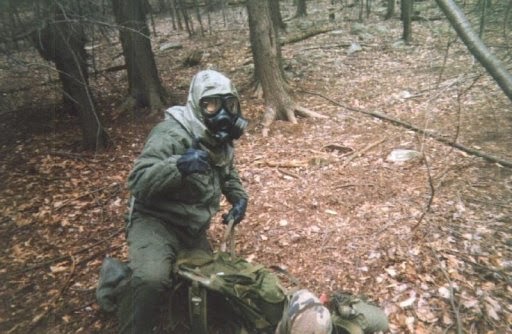I wrote this in 2000. I believe it was published in 2001 in the Fort Leonard Wood base newspaper. I can only hope that things have changed since then.
We treat them like shit, you know.
It’s not often consciously thought about – the way we treat those trainees who aren’t going to make it, even though we’ve all seen them, we’ve all dealt with them. In my nearly three years here, I’ve seen a lot of them.
I am a nuclear medicine technologist, and for those of you who don’t know what that means, suffice it to say that I’m one of the people who does bone scans – a diagnostic test that definitively tells us whether or not someone has a stress fracture; a bone injury that’s caused by repetitive stress rather than a sharp break like a “normal” broken bone. In the civilian world, it’s rather rare for a test as expensive as a bone scan to be done for stress fractures; patients are normally told to take it easy and stay off of it.
Over half of my patients on Fort Leonard Wood have been trainees, seeing whether or not they have stress fractures.
Or rather, to see whether or not they’re “faking it”.
Sometimes, a drill sergeant will actually accompany the trainee when they come to thier appointment; often this is accompanied by an aside that can be paraphrased as “they’ve been faking it for weeks”.
Every one of those patients have had a real injury.
A lot of them do, actually – when I did a review of our trainee patients, I found that over ninety percent of them had bone injuries (which isn’t even saying the other ten percent weren’t hurt – just that it wasn’t the bones). Why or how so many trainees have been hurt isn’t what bothers me, though – the kind of conditions that cause stress injuries are set up from before they even meet the recruiter, let alone reach Basic training.
What bothers me is the attitude that many of my fellow permanent party soldiers have towards these trainees: They tend to assume the trainee is faking an injury, or treat injured trainees (especially those going to be chaptered) as if they’re useless, a waste of space.
I had my own failing with this when I was working as an X-ray technician at a CTMC in Korea. I X-rayed one Korean soldier at least ten different times over two weeks; the doctor there was looking for air inside the chest wall (“spontaneous pneumothorax” to be technical). They all came back negative, film after film, and finally I voiced the opinion, rather loudly, that he was faking it.
That day’s film clearly showed, even to my eye, the injury the doctor was looking for.
I am aware of the demands of the training environment, and how trainees must be pushed past what they thought they could perform. I am well aware of that minority that try to escape training by “riding” sick call. But this is not nearly as stupid as the way we, as an Army, treat those who are being recycled in their class or being chaptered out of the military because of an injury.
They are used to perform menial jobs until they’re chaptered or while they’re recuperating – sometimes without regard to the profiles (or “codes”) that have been prescribed by a physician. They are treated as if they are useless – and I’ve heard many accounts of trainees actually being told that. Of being treated as less than human, simply because they’ve been hurt.
Again, I can understand the mentality that creates this environment. We want to reward those who can make it, those who succeed – but this doesn’t mean we have to ridicule or insult those who, for whatever reason, can’t.
Think about this, my fellow soldiers. They – the ones who do not make it – are the ones who will go back to civilian life. They – not the graduates – are the ones who will be among civilians, their peers.
Our recruitment pool.
It’s a well-established fact that people will relate a negative experience to more people than a positive one. It’s also known that word-of-mouth is an even more powerful method of advertising than magazine, television, or radio ads.
By demeaning those who simply don’t make the cut, we are inadvertently projecting a powerful image to the civilian population – to those who our recruiters are trying to entice to enlist. It is not a positive one.
I’ve met nearly every trainee that was chaptered at Fort Leonard Wood due to stress fractures during my time here. I’ve talked to many of them. While there were some that just wanted out, the vast majority of them were truly motivated – at least initially. They wanted to be soldiers. They wanted to succeed. They were scared that their own bodies could keep them from graduating.
I saw a saddening number of them lose that motivation as they waited for chapters. I saw them become demoralized. I saw them grow bitter towards the military because of the way they were treated.
I have no doubt what those potential soldiers told their friends when they returned home.
While I was in Korea, we were constantly reminded that we, as soldiers and American citizens, were representatives of both our country and the military. That how we acted shaped how people would feel about both America and the U.S. Army.
Perhaps it’s time for us to recognize that here at home as well.
